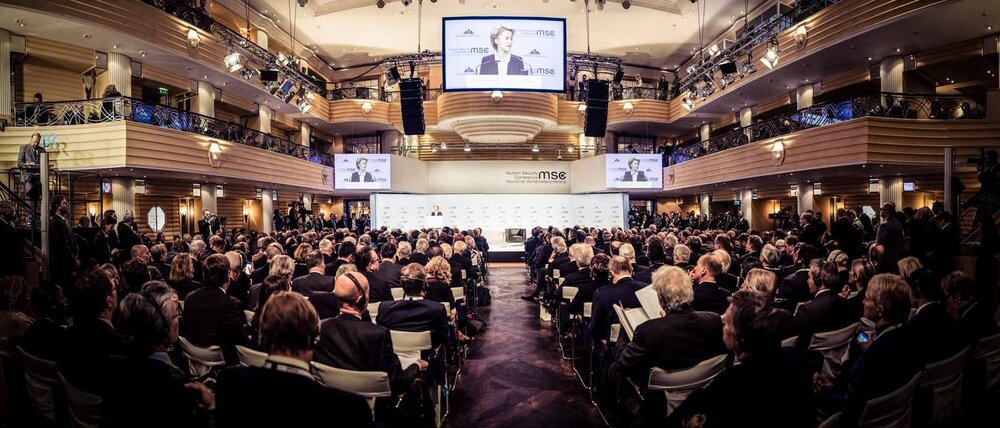Munich Security Conference duty regarding the assassination of commander Soleimani

This year's Munich Security Conference is being held for the fifty-sixth time from 14 to 16 February. The meeting is held annually to discuss the world's security problems and to come up with a unified solution to them.
Significantly, to date, these meetings have not been able to function effectively in resolving global security problems. The chaotic situation in today's world is the reflection of this inability. Now the question is that how this year's summit can achieve the goals proposed by its founders, namely global security and stability.
To answer this question, it is important to consider the key issues of global security and stability. A look at the process of developments shows that the world is facing a series of terrorism, each of which poses many security risks.
The first challenge of today’s world is economic terrorism which is carrying out in the form of monopolies and economic sanctions and threats against other countries. This terrorism is directly targeting nations, as can be seen in economic sanctions imposed by U.S. and Europe against other countries. These sanctions aim to impose political demands and bring other countries to their knees.
Economic terrorism even applies in food and medicine fields, which should not be sanctioned according to all international laws, even during the war. It is inhuman terrorism that has repeatedly been perpetrated by the U.S. and its European allies and has endangered the lives of many people around the world.
The second is cultural terrorism, which claims that Western or sometimes American culture is superior to other cultures. Projects such as “The Greater Middle East”, which is currently being carried out, seek to destroy the identity of other nations.
The cultural war that has launched in the world arena by the West is an example of cultural terrorism, including Islamophobia, racism against colored people and natives, critical situation of Indigenous people in Canada, the U.S. and Australia and removing the identity of other nations, as the Deal of the Century, by wich millions of innocent Palestinians have been deprived of their right and identities.
The cultural terrorism waged by the U.S. and its allies and has caused many wars and injustices around the world, with increasing number of victims every day.
The third is scientific terrorism that the West seeks to inflict. Monopoly in the field of nuclear science comes while according to the Treaty on the Non-Proliferation of Nuclear Weapons (NPT) all IAEA members have the right to enjoy peaceful nuclear education. Monopoly in the aerospace field is a sample of this terrorism.
Countries that have nuclear weapons, such as France, call its nuclear bombs the cause of Europe stability. The U.S., which allocates $ 700 billion to upgrade its nuclear missile capability, has been obstructing other nations' access to peaceful nuclear knowledge and even sanctioning and threatening them.
Interestingly, the same Western states that express concern over the world’s nuclear security do not even adhere to their nuclear commitments. The non-commitment of the P5+1 in the JCPOA (Joint Comprehensive Plan of Action) despite of all Iran’s commitments is a clear sign of the nuclear monopoly by these countries.
Any country has the right to access to defense industry, including the missile sector, to secure itself. This is while the West does not consider this very simple right for other countries, a matter that can easily be seen in its attempt for destroying Iran’s missile capability, which is purely defensive. Interestingly, the scope of scientific terrorism has even influenced the field of scientific researches. The U.S. and French hostile position towards Iranian satellite achievements indicates this scientific apartheid.
Fourth is military terrorism, which is another aspect of security threats and is formed by terrorist acts of those who claim are fighting terrorism. The so-called counterterrorism U.S.-led coalition in recent years has not only had not combating terrorism but has been widely supported it to the point that it has officially become a shelter for terrorists in Syria and Iraq.
Military moves by these countries against Syria and Iraq shows that they are fostering terrorism. Their support for Saudi state terrorism against the oppressed Yemenis and the Zionist state terrorism against the Palestinians reveal another aspect of their fostering of terrorism.
Their support for terrorism is such that, in a move against regional and global security, in the apparent terrorist act and war crime, they assassinated Commanders of the resistance movement, Major General Qassim Soleimani, commander of the Quds Force of the Islamic Republic of Iran, deputy chief of the Popular Mobilization Committee (PMC) Abu Mahdi al-Muhandis and their companions. These martyrs are considered as elements who played an important role in the fight against terrorism.
Regarding these points, if this year’s Munich Security Summit seeks to resolve the world's security crises, it should focus on confronting the types of terrorism listed.
Emphasizing on the withdrawal of foreign forces, especially the U.S., from West Asia, countering the economic, cultural, scientific and military terrorism, expressing tribute to the commanders of the resistance movement, in particular Commander Soleimani and Abu Mahdi al-Muhandis, by the participants of the summit and condemning U.S. state terrorism are preliminary steps to need to be taken to prove the intention of the Munich Security Summit for world peace and security.

Leave a Comment